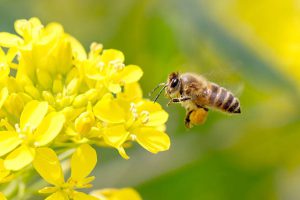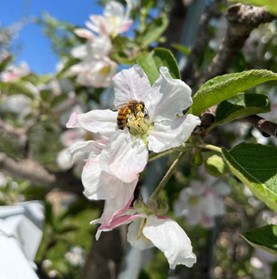Inside the great Canadian bee battle: ‘It’s a crazy situation’
A long-simmering feud over where this country’s honey producers can obtain bees to replenish their stock goes to the courts Monday (November 6), pitting some of Western Canada’s beekeepers against the federal government in a battle over whether this country’s ban is lawful or necessary.
By Kate Allen Climate Change Reporter, Steve McKinley Staff Reporter

John Gibeau says he can sometimes see American honeybees flying around just across the border when he takes his own colonies to pollinate blueberry crops in the southern part of British Columbia.
But if Gibeau wants to buy those bees in bulk — say, to restock his colonies after a long winter — he can’t do it.
The Canadian government has long placed a ban on the importation of large shipments of U.S. bees.
A long-simmering feud over where this country’s honey producers can obtain bees to replenish their stock goes to the courts Monday, pitting some of Western Canada’s beekeepers against the federal government in a battle over whether this country’s ban is lawful or necessary.
But the class-action suit is also threatening to expose major rifts within the apiary community, delineated on one side by those who argue that the risk of importing pests and diseases along with the U.S. bees is too high, and on the other by those who feel that the importation ban is unfairly harmful to their businesses.
Win or lose, those involved say what is at stake is not just the already-plagued beekeeping industry, but the health of Canada’s food system.
“Your food is not produced in the stores … It’s (produced) in farmers’ fields,” said Ian Grant, president of the Ontario Beekeepers’ Association, adding that up to a third of crops are pollinated by bees.
“Without bees, you’re not going to have the same quantity of food or quality of food.”
Canadian winters are harsh. That is especially true for honeybees, a non-native species imported to North America by European colonists. Canadian beekeepers see varying levels of die-offs every season. The 2022 winter was a particularly brutal one, with beekeepers reporting an average of 45 per cent losses — double the recent average.
Aside from weather, a long list of pests and pathogens have also beset honeybees, including varroa mites, small hive beetles and American foulbrood. Researchers are also worried about what they call “Africanized honeybee genetics” and what the media sometimes calls “killer bees” — a hybridized honeybee found in the Southern U.S., but not Canada, that aggressively defends its territory and poses a threat to human health.
Research also suggests that some of these problems are spilling over into wild, native bee populations, a threat to Canada’s wider ecological health.
When replacing or expanding their colonies, beekeepers have two main options. One is to purchase queens, a small box with a single queen bee and a few attendants. Another is to buy a full bee “package,” a box the size of a toaster oven filled with two or three pounds of bees.
In the 1980s, fearing American bees would bring pests and pathogens over the border, the government prohibited imports of bees from the U.S. in any form. In 2004, the Canadian Food Inspection Agency (CFIA) began allowing imports of queens, but continued to prohibit U.S. bee packages.
The class-action lawsuit, which was initiated almost a decade ago, revolves around a question of administrative law. The plaintiffs’ statement of claim alleges that after the last order banning U.S. bee package imports expired at the end of 2006, officials simply communicated to the beekeeping industry that no import permits would be granted, so they shouldn’t apply — a move the plaintiffs describe as having no lawful authority.
A spokesperson for the Canadian Food Inspection Agency said the department would not comment on a matter before the courts. A statement of defence filed on behalf of the CFIA and the minister of agriculture and agri-Food denies all the plaintiffs’ claims, and states that the defendants have both a lawful authority and a public duty to restrict honeybee importation because they are satisfied doing so would prevent the introduction and spread of pests and diseases.
Gibeau, whose family operates Honeybee Enterprises in Surrey, B.C., and who is one of three lead plaintiffs in the case, says that because of the ban on U.S. bee packages, he is forced to buy them from countries such as New Zealand, where packages are more expensive and of worse quality because of the long travel. If not for the ban, he says, could get them from California for a fraction of the price.
“It’s a crazy situation,” said Gibeau.
Gibeau says the prohibition has driven thousands of beekeepers out of business, and believes the government’s concerns about importing U.S. packages should be allayed by the fact that imports of queens are still allowed, but none of these have introduced Africanized genetics……
To read the complete article go to; This great Canadian bee battle is headed to court (thestar.com)
Kate Allen is a Toronto-based reporter covering climate change for the Star. Follow her on Twitter: @katecallen.
We are here to share current happenings in the bee industry. Bee Culture gathers and shares articles published by outside sources. For more information about this specific article, please visit the original publish source: This great Canadian bee battle is headed to court (thestar.com)








